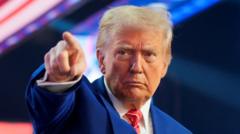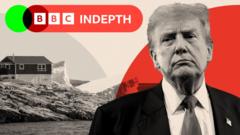Trump’s recent statements on the Panama Canal reflect a potential shift in US diplomacy and trade policies under his leadership.
Trump Calls for Panama Canal Fee Reductions, Threatens Reclaiming Control

Trump Calls for Panama Canal Fee Reductions, Threatens Reclaiming Control
In an assertive speech at a conservative gathering, Trump demands Panama to lower shipping fees or face US claims on the canal.
The 51-mile Panama Canal remains a pivotal point between the Atlantic and Pacific Oceans, historically controlled by the US until the late 20th century. At his first major address since the election results, President-elect Donald Trump addressed thousands at the Turning Point USA annual conference, articulating his frustration with Panama's canal fees. He accused the country of imposing “exorbitant prices” on American shipping and naval vessels, vowing to make these financial burdens cease as he assumes presidency in January.
“The fees being charged by Panama are ridiculous, highly unfair,” Trump stated to an enthusiastic crowd in Arizona on Sunday. His dramatic claim that if rates were not reduced, the US would demand the canal’s return has garnered immediate attention and pushback. Panamanian President José Raúl Mulino swiftly responded, asserting that the entire canal belonged to Panama, emphasizing that their sovereignty was non-negotiable.
Trump characterized the 50-mile canal as a “vital national asset” for the United States while outlining his intentions to renegotiate what he sees as unreasonable tariffs imposed by Panama. The canal is pivotal for commercial maritime traffic, with around 14,000 vessels traversing annually, predominantly container ships vital for trade.
The remarks also extend Trump’s critique of Canada's and Mexico's trade practices, making a point that ran in tandem with historical sentiments of his administration. As he navigated through lingering themes about immigration, crime, and international affairs, it became clear that Trump is keen on revisiting and potentially recalibrating American foreign relations.
His address also touched on domestic economic concerns, such as inflation and government spending, indicating a focus that may characterize his next phase as leader. While other speakers criticized government expenditures and voiced party divisions, Trump maintained a unifying tone for conservatives present at the conference.
The discourse set forth by Trump signals a possible return to the controversial tactics seen during his first term, as he balances confidence on the international front and rallies his base to support his vision for America’s role in world affairs.
“The fees being charged by Panama are ridiculous, highly unfair,” Trump stated to an enthusiastic crowd in Arizona on Sunday. His dramatic claim that if rates were not reduced, the US would demand the canal’s return has garnered immediate attention and pushback. Panamanian President José Raúl Mulino swiftly responded, asserting that the entire canal belonged to Panama, emphasizing that their sovereignty was non-negotiable.
Trump characterized the 50-mile canal as a “vital national asset” for the United States while outlining his intentions to renegotiate what he sees as unreasonable tariffs imposed by Panama. The canal is pivotal for commercial maritime traffic, with around 14,000 vessels traversing annually, predominantly container ships vital for trade.
The remarks also extend Trump’s critique of Canada's and Mexico's trade practices, making a point that ran in tandem with historical sentiments of his administration. As he navigated through lingering themes about immigration, crime, and international affairs, it became clear that Trump is keen on revisiting and potentially recalibrating American foreign relations.
His address also touched on domestic economic concerns, such as inflation and government spending, indicating a focus that may characterize his next phase as leader. While other speakers criticized government expenditures and voiced party divisions, Trump maintained a unifying tone for conservatives present at the conference.
The discourse set forth by Trump signals a possible return to the controversial tactics seen during his first term, as he balances confidence on the international front and rallies his base to support his vision for America’s role in world affairs.























